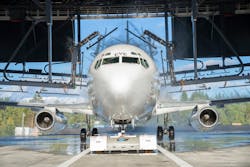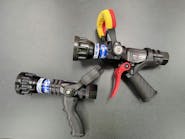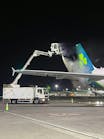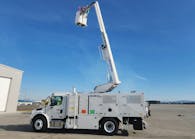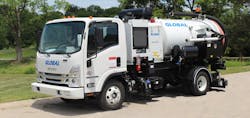In Norway, what some are calling the future of aircraft washing and deicing is being developed – with ideas borrowed from the local carwash.
The Multi Solution Gate (MSG) is the first automatic system for washing and deicing aircraft in the world, said Frøydis Hovden, MSG Production’s Vice President of Sales, adding that people are surprised it’s taken so long to come up with the idea.
“It’s one of those things that when we present it, people say, ‘why has nobody thought about this before?’ Because it is so obvious,” Hovden said. “We’re talking today about driving automated cars and flying with no pilots, so why do we need a person to stand there and do this manual operation to the plane? It doesn’t make any sense for the future.”
The MSG works similarly to the way an automatic carwash operates. After a plane has entered the MSG’s hangar, the robotic arms of the system descend and move around the plane for automatic washing and deicing, needing only a person in a cabin on the ceiling above the system for operations, and a person on the ground to help coordinate, as crew. The aircraft is helped guided through the MSG by an electric tug.
“It’s all automated so it’s a lot safer and more environmentally friendly,” said Hovden. “It’s very exciting and it’s really something very new.”
The environmental benefits of the MSG are multifold. Being inside a hangar allows for the easy capture and containment of ADF and an on-site recycling system makes for quick processing of the fluid, which can then be resold. The automatic nature of the MSG also ensures only as much deicing fluid as needed is sprayed.
“Normally, you have one deicing truck on either side of the plane and it’s sometimes hard for them to make the exact same movements and use the exact same amount of fluid. But in our system, it is all pre-programmed so you know you will have exactly the correct amounts according to the regulations,” Hovden said.
A clean aircraft is, as MSG’s research points to, an environmentally friendly aircraft, and by streamlining the washing process, Hovden said airlines can expect lower emissions from their planes.
“We have research telling us that you can get as much as 2 percent savings for fuel if you fly a clean aircraft as opposed to a dirty one, and 2 percent is a lot of CO2 emissions and saves costs for the industry,” she said. “We talk to many airlines about this issue now and they tell us it’s very time-consuming and complicated to do the washing. You have to put the aircraft away for the night and have hangar capacity and it’s time consuming, which is why they don’t clean it as often as they should… So, we think by making it easier and quicker to clean aircraft, it will get done more often and be a contribution to the environment by itself.”
Hovden said the MSG can accommodate a Boeing 737 sized aircraft and smaller, with deicing taking only four to six minutes and 20 minutes for washing.
For installation, Hovden said that airports could renovate existing hangars for the MSG, but that it is more cost effective to build new – and altogether the MSG takes up 29,063 square feet.
New onto the market, Hovden said she anticipates MSG Production will be making its first sales of the MSG later this year to airports in Saudi Arabia and Scandinavia countries.
“We are working on the first commercial delivery now. Negotiations are in the works to make delivers this and next year,” she elaborated. “I think this is something that will be used worldwide in a few years.”
